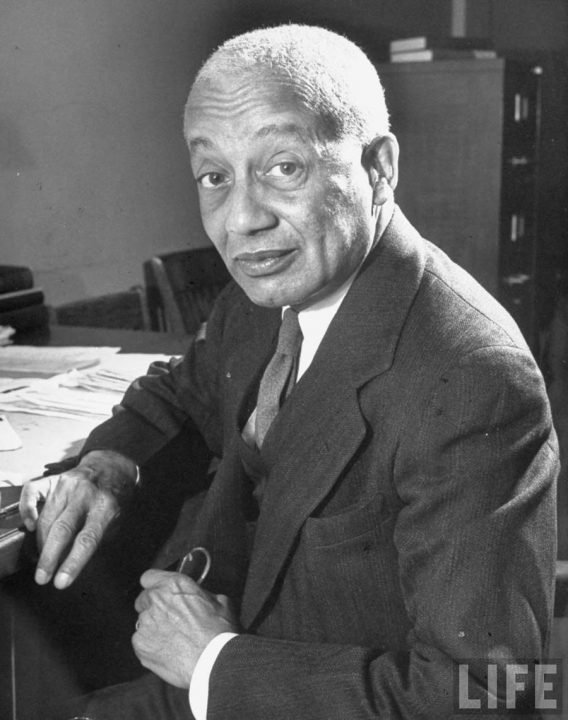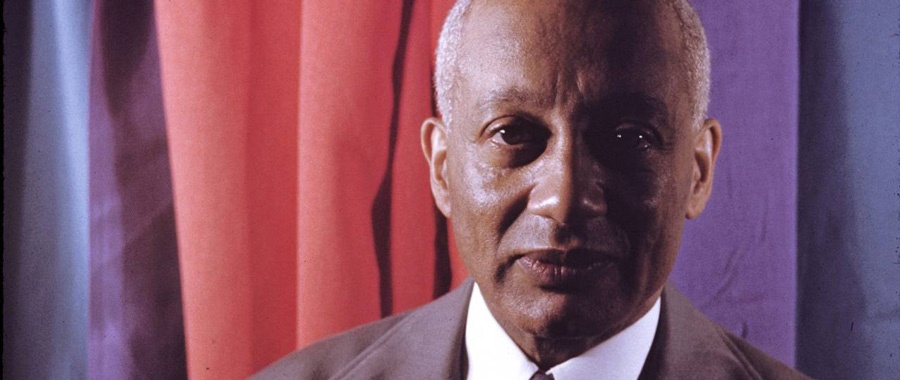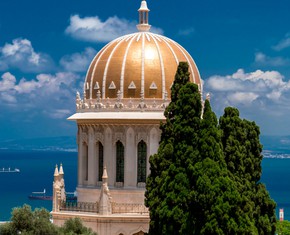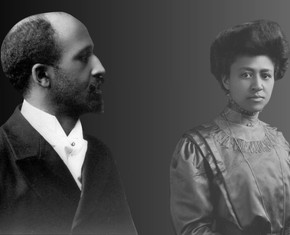The views expressed in our content reflect individual perspectives and do not represent the authoritative views of the Baha'i Faith.
The Baha’i philosopher Alain Locke has emerged back into the limelight, since his latest biography won the 2019 Pulitzer Prize in Biography – and the 2018 National Book Award for Nonfiction.
Jeffrey C. Stewart, author of The New Negro: The Life of Alain Locke, won both of those prestigious awards, a rare occurrence and a signal achievement that few books have ever attained.
Two earlier biographies of Alain Locke have been published: Alain L. Locke: The Biography of a Philosopher, by Leonard Harris and Charles Molesworth; and one that I wrote and Kalimat Press published in 2005, titled Alain Locke: Faith and Philosophy.
In the newest biography, author Jeffrey Stewart says relatively little about the Baha’i dimension of Locke’s life and legacy, but does credit Locke’s Baha’i faith as part of his “vision:”
Locke’s vision remains a curious blend of pragmatism (“psalms will be more effective than sermons”) in converting the heart of the oppressor to empathize with the oppressed, religious consciousness (a blend of Christianity and his Baha’i faith), mild Afrocentrism (a return to an African past as a non-Western basis of a Black modernism), and philosophical idealism. – Jeffrey C. Stewart, The New Negro: The Life of Alain Locke, Oxford University Press, Kindle Edition.

Stewart elsewhere states that Alain Locke “became, in the 1920s, one of the most influential American Baha’is.” That said, Stewart treats Locke’s Baha’i identity and worldview as peripheral, at best. Instead, Stewart focuses on the fact that Locke was gay – even though Locke preferred to keep this part of his life discreet, referring to his homosexuality as his “Achilles heel,” as I have stated in Alain Locke: Faith and Philosophy:
There was never a reconciliation between Locke’s homosexual private life and his Baha’i identity. The two stood in unresolved tension, necessarily compartmentalized and insulated from one another. … That Locke exercised care in keeping his homosexuality discreet is one thing. … I discovered another autobiographical note that directly addresses the issue of Locke’s homosexuality—a document that appears to have eluded scholars until now. Dated 10 June 1948, Locke wrote:
My wise and loving Mother dipped me as a very young child in the magic waters of cold cynicism and haughty distrust and disdain of public opinion and this with satisfaction of an almost [illegible] child. However the all too vulnerable/invulnerable Achilles heel of homosexuality – which she may have suspected was there, both for her sake and [for] my own safety, I kept in an armoured shell of reserve and haughty caution. I realize that to bask in the sunshine of public favor, I would have to bathe in the dangerous fatal pool of publicity. – Buck, Alain Locke: Faith and Philosophy, pp. 196–197.
Professor Stewart’s Pulitzer Prize-winning book, The New Negro: The Life of Alain Locke, emphasizes Locke’s sexuality, from start to finish. By contrast, my book takes a different path, focusing on Locke’s intellectual, philosophical and spiritual legacy:
Locke’s orientation is simply a fact of his life, a facet of his personality that history ought not to obscure. The problem for the biographer is to assess how important this fact of Locke’s homosexuality is. To what extent does it serve as a key to interpreting Locke’s thought? Surely, Locke’s homosexuality ought not diminish his greatness, whether as a “race man” or as a Baha’i. For some, of course, Locke’s homosexuality is an indispensable heuristic in properly understanding and appreciating his universalism.
Consonant with this interpretation is Harris’s estimate: “How is it possible to honor Locke, that is, exalt him because of his intrinsic qualities, virtues of character – his courage? How can we love and respect him as an aesthete, friend, philosopher, pragmatist, American, African American, and homosexual?” Harris answers this rhetorical question by saying: “One way it is possible, I think, to progressively surmount the vagaries of prejudice is through philosophies born of struggle to overcome oppression.” That is, we can best honor Locke by carrying forward his philosophy. – Ibid., p. 198.
On this complex issue, the Universal House of Justice wisely advised me:
As you well realize, a good biography is not merely a catalogue of everything that can be said about a person. The writer must select, from the mass of material available, those facts which are of significant relevance to the themes being treated. You have entitled your book “Alain Locke: Faith and Philosophy”. The first point for you to consider, therefore, is whether his alleged homosexuality is relevant to the subject. If it is, to a significant degree, you would be justified in mentioning it in its proper context. If it is not relevant, for what reason would you feel obliged to introduce it? The second point is an author’s relationship to his subject and respect for the right of a person, even when dead, to a degree of privacy and reticence with regard to intimate aspects of his or her personal life. In this connection, you could consider Alain Locke’s own attitude to his sexuality: did he show reticence about it in his own lifetime? How do you think he would have felt about reference to its being included in a discussion of his life and work? The House of Justice feels confident that, with these points in mind, you will be able to arrive at a reasoned conclusion. – The Universal House of Justice, letter dated 17 October 2001.
In writing my own book, I also took my cues from Abdu’l-Baha and Shoghi Effendi, who both had high praise for Alain Locke. In a letter written in 1921, the last year of his life, Abdu’l-Baha wrote:
“Dr. Locke, this distinguished personage, deserveth every praise. I implore the Kingdom of God to grant him special confirmations.” (ḥaḍrat-i Dr. Locke īn shakhṣ-i jalīl fī al-ḥaqīqih sazāvār-i har sitāyish ast. taḍarruʿ bi-malakūt-i ilāhī mīnamāyam kih taʾyīdī makhṣūṣ bi-ū farmāyad.) – Abdu’l-Baha (provisional translation and transliteration by Omid Ghaemmaghami, May 7, 2011), Tablet of ‘Abdu’l-Bahá to Agnes Parsons, July 26, 1921. Persian original archived in “The Original Tablets from ‘Abdu’l-Bahá Collection,” National Bahá’í Archives, United States. (Digital scan courtesy of Roger M. Dahl, Archivist, National Bahá’í Archives, United States.) Original provisional English translation (typescript) archived in Leone Barnitz Papers, Box 17: Agnes Parsons correspondence/‘Abdu’l-Bahá. (Digital scan courtesy of Lewis V. Walker, Assistant Archivist, National Bahá’í Archives, United States.) See: “Sing the Ballad of Alain Locke—Burying the Black Plato” (Oct. 10, 2014), https://bahaiteachings.org/sing-the-ballad-of-alain-locke-burying-the-black-plato.
In 1924, Shoghi Effendi, the Guardian of the Baha’i Faith, sent this message through his secretary to Alain Locke:
Shoghi Effendi was very glad indeed to hear from you and learn that you have been in good health. He cherishes in his loving heart great hope for your spiritual success. People as you, Mr. Gregory, Dr. Esslemont and some other dear souls are as rare as diamond. You should first be mindful of your physical health and then take steps along the channel of the regeneration of mankind. The world, more than ever, is in need of spiritual nourishment. You are the chosen ones to render this service to the lifeless world in this present stage. – quoted in Buck, Alain Locke: Faith and Philosophy, pp. 107-108.
Here, Shoghi Effendi compared Alain Locke (“rare as diamond”) to the celebrated African American Baha’i Louis Gregory – posthumously honored by being named as a “Hand of the Cause of God,” the highest appointed position in the Baha’i Faith; and to Dr. John Esslemont, an eminent Scottish Baha’i also posthumously honored by being named as a Hand of the Cause of God as well as one of the “Disciples of Abdu’l-Baha.”
Finally, this quote from Alain Locke himself goes to the heart of his life and legacy:
We must begin working out the new era courageously, but it must be a revolution within the soul. How many external wars and revolutions it will make unnecessary, if it is only possible! And we must begin heroically with the great apparent irreconcilables; the East and the West, the black man and the self-arrogating Anglo-Saxon, for unless these are reconciled, the salvation of society in this world cannot be. If the world had believingly understood the full significance of Him who taught it to pray and hope “Thy Kingdom come on earth as it is in Heaven” who also said “In my Father’s house are many mansions”, already we should be further toward the realization of this great millenial [sic] vision. The word of God is still insistent, and more emphatic as the human redemption delays and becomes more crucial, and we have what Dr. Elsemont [Esslemont] rightly calls Baha’u’llah’s “one great trumpet-call to humanity”: “That all nations shall become one in faith, and all men as brothers; that the bonds of affection and unity between the sons of men should be strengthened; that diversity of religion should cease, and differences of race be annulled … These strifes and this bloodshed and discord must cease, and all men be as one kindred and family.[”] – Ibid., pp. 279-280.
Alain Locke’s legacy is what he has publicly championed — ideal race relations, a more truly democratic democracy, a more truly American “America,” and a world in which “just as world-mindedness must dominate and remould [sic] nation-mindedness, so we must transform eventually race-mindedness into human-mindedness.” – “Stretching Our Social Mind” (1944).
















Comments
Sign in or create an account
Continue with Googleor